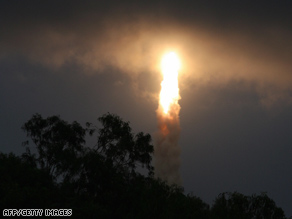NEW DELHI, India (CNN) -- India blasted into the
international space race Wednesday with the successful launch of an
ambitious two-year mission to study the moon's landscape.

The spacecraft carrying India's first lunar probe, Chandrayaan-1, lifts off in Sriharikota on Wednesday.
The unmanned
lunar orbiter Chandrayaan-1, or "moon craft" in ancient Sanskrit,
launched at 6:20 a.m. (8:50 p.m. ET) from the Sriharikota space center
in southern India.
The mission seeks high-resolution imaging of
the moon's surface, especially the permanently shadowed polar regions,
according to the Indian Space Research Organization. It will also
search for evidence of water or ice and attempt to identify the
chemical breakdown of certain lunar rocks, the group said.
Despite the numerous missions to the moon over the past 50 years, "we
really don't have a good map," said Miles O'Brien, CNN chief technology
and environment correspondent. "The goal is to come up with a very
intricate, three-dimensional map of the moon."
The Chandrayaan-1 is carrying payloads from the United States,
European Union countries Germany, Britain, Sweden and Bulgaria, and
India plans to share the data from the mission with other programs,
including NASA.  Watch the launch of India's first lunar mission »
Watch the launch of India's first lunar mission »
ISRO said on its Web site that the mission would lay the groundwork for
future lunar missions and "probe the physical characteristics of the
lunar surface in greater depth than previous missions by other nations."
"It will also give us a deeper understanding about the planet Earth
itself or its origins," a statement on the Web site said. "Earlier
missions did not come out with a full understanding of the moon and
that is the reason scientists are still interested. This will lay the
foundation for bigger missions and also open up new possibilities of
international networking and support for planetary programs."
Until now, India's space launches have been more practical, with
weather warning satellites and communiations systems, The Associated
Press cited former NASA associated administrator Scott Pace as saying.
To date, only the U.S. Russia, the European Space Agency, Japan and China have sent missions to the moon, according to AP.
Critics of the mission have questioned its $80 million price tag,
saying the money should have been spent by the government to improve
education and fight poverty.
But, "there are scientists that
would argue that there are plenty of things we don't know about the
moon ... and India might have the know-how" to find answers, said CNN's
Sara Sidner in New Delhi.
The United States and the Soviet
Union dominated the field of lunar exploration from the late 1950s. The
United States is preparing for its own mission slated for next spring
-- the first U.S. lunar mission in more than a decade, according to
NASA.
Soviet spacecraft were the first to fly by, land on and
orbit the moon. Luna 1, launched on January 2, 1959, and sped by the
moon two days later.
Luna 2 was launched on an impact mission on
September 12, 1959, striking the surface two days later. Luna 9
launched on January 31, 1966, becoming the first craft to successfully
land on the moon and send back data, touching down on the surface on
January 31, 1966, and transmitting until February 3, 1967, when its
batteries ran out.
Luna 10 was launched March 31, 1966, entered lunar orbit on April 3, and operated for 56 days.
But the United States' Apollo missions were the first manned missions
to reach the moon, culminating with six missions that set down on the
surface. The first, Apollo 11, left earth on July 16, 1969, and landed
astronauts Neil Armstrong and Edwin Aldrin on the lunar surface on July
20 while command module pilot Michael Collins orbited above. The
astronauts returned safely to earth on July 24.
Most recently India's fellow Asian
nations, China and Japan, put lunar orbiters in place. Japan launched
the Kaguya orbiter in October 2007, followed by China's launch of the
Chang'e mission a few weeks later.  Watch what is shaping up to be a new space race »
Watch what is shaping up to be a new space race »
"Each nation is doing its own thing to drive its research technology
for the well-being of that nation," AP quoted Charles Vick, a space
analyst for the Washington think tank GlobalSecurity.org, as saying.







